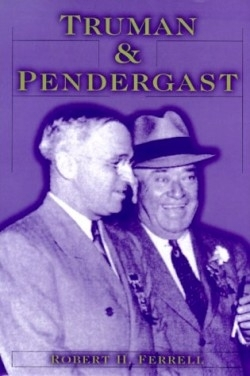
Truman and Pendergast
Few verbal assaults riled Harry S. Truman more than being called the “Senator from Pendergast,” a reference to Thomas Pendergast, Truman’s political mentor and corrupt boss of the Kansas City, Missouri, Democratic Party machine during Truman’s years as county judge from 1927 through 1939.
During Pendergast’s reign, Kansas City was notorious for its crime, prostitution and political kickbacks for federal, state and county contracts doled out by the boss. By 1939 the machine era was coming to an end and Pendergast was sentenced to Fort Leavenworth Prison for income tax evasion. Despite this, Truman maintained his integrity and committed no unlawful actions. Pendergast’s reputation, however, haunted Truman throughout his entire political career. During his successful 1934 senate campaign, Truman endured such barbs as the one issued by his opponent who remarked that as a senator Truman would get “calluses on his ears listening on the telephone to orders of his boss.”
Ferrell is the foremost authority on Truman and author of several books about the thirty-third president, including the praised Harry S. Truman: A Life (Missouri 1994). In this newest book, he offers a readable investigation of the complex Pendergast-Truman relationship and how Pendergast’s reputation nearly cost Truman his 1940 re-election to the Senate and consequently his political career.
The arrest of Pendergast and the collapse of his machine were major embarrassments for Truman during the 1940 campaign. Although his colleagues regarded him as a diligent and forthright senator, they kept him at arms length and President Roosevelt offered no initial support, despite “not being privately alarmed of wrongdoing, so long as it…supported Democratic purposes.” Ferrell notes, however, one of Truman’s enduring strengths was to confront and overcome adversity. Truman rebounded with a “give ’em hell Harry” campaign—a style that served him so well during the memorable presidential election of 1948—and despite meager funding and poor organization, he defeated Missouri governor Lloyd Stark, an honorable but lackluster opponent.
Ferrell does not match the narrative eloquence of David McCullough’s Pultizer Prize-winning biography Truman (Simon and Schuster 1992), but his notable use of current oral histories and personal papers from the Historical Society of Missouri, along with his own concise, fine writing make this a worthy addition to the literature of one of America’s most beloved presidents.
Reviewed by
Karl Helicher
Disclosure: This article is not an endorsement, but a review. The publisher of this book provided free copies of the book to have their book reviewed by a professional reviewer. No fee was paid by the publisher for this review. Foreword Reviews only recommends books that we love. Foreword Magazine, Inc. is disclosing this in accordance with the Federal Trade Commission’s 16 CFR, Part 255.
